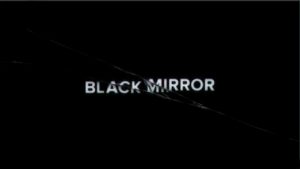Caitlin Whitington. Tutorial group 02.
As humans, we can’t help but wonder about the future possibilities of technology – it is a subject that has been explored endlessly through fictitious media from Ridley Scott’s Blade Runner (1982) to William Gibson’s Neuromancer (1984) to, now, Black Mirror (2011.) Black Mirror is an English television series created by Charlie Brooker that illustrates some of our current fears and desires of new technologies. Each stand-alone episode is set in a not-too-distant, dystopian future where characters grapple with the possibilities and affordances of their technologies and how they effect their relationships, careers, lives and identities. Black Mirror reached massive levels of worldwide success as it reflects and heightens contemporary anxieties about new technologies including privacy and security issues, the economy of likes and digital capitalism, artificial intelligence and robots, online/ offline identities and political surveillance and control.

While every episode of Black Mirror is worthy of dissection and analysis, I have chosen one particularly poignant episode to explore in this essay; Season 3 Episode 1: Nosedive. Nosedive (2016), written by Rashida Jones and Michael Schur alongside show creator Charlie Brooker, is set in a society obsessed with individual rankings. People are fitted with contact lenses that automatically display the ranking of the people around them from a scale of 0-5 stars, and they rank each other on a smartphone app based on the quality of their interactions. Subsequently, ones individual ranking directly impacts their socioeconomic status and opportunity. The episode follows Lacie Pound (Bryce Dallas Howard), a 42-year-old office worker as she tries to raise her ranking from a 4.2 to a 4.5 in order to receive a discount on a new, luxury apartment. After seeing a consultant, she is advised to have more five-star interactions with higher ranked people. She is invited to be the maid of honor at an old friends very exclusive and glamourous wedding, however several mishaps along the way cause her ranking to be severely decreased and she is ultimately uninvited to the wedding due to her low rank. Nosedive illustrates anxieties regarding software capitalism and the economics of “likes” as well as the dynamics of free digital labor, identity politics and contemporary cancel culture. Nosedive also illustrates the ways in which digital participation and online cultural production can act as a means to discipline users and create a new capitalism.

Danah Boyd writes that “…the ways in which technology structures [networked publics] introduces distinct affordances that shape how people engage with these environments.” (Boyd, 2010, p.39) The untitled social media platform featured in Nosedive encourages users to rank each and every person they come into contact with in their day. Due to the significance placed on your ranking, Lacie feels immense pressure to make every interaction meaningful and pleasurable and constantly gives out five-star ratings in the hopes that she will receive the same in return. Another way to receive ratings is by posting images and updates onto your feed, which closely resembles Facebook and Instagram. Thus, Lacie feels the need to not only be extremely pleasant in person but also to reflect this personality online as it is an “[arena] for the formation and enactment of social identities.” (Boyd, 2010, p.41.) Uschi Klein writes, “… individuals perform their selves to influence others. Depending on their roles, relationships, and statuses those performances are restricted by social and cultural norms.” (Klein, 2015, p.89.) Due to her need for more high ratings from higher ranked people, Lacie dresses up and presents herself as classy and sophisticated to her imagined audience; the people ranked over 4.5.

The rating system in Nosedive has been likened by critics to the “like” function on many social networking sites. Currently, Instagram and Twitter users with a high amount of followers and likes are likely to receive sponsorships, advertisement opportunities and/or brand deals. In Nosedive, people with high rankings can access exclusive and luxury living arrangements, transportation, accommodation and career opportunities. In both current society and the fictitious world of Nosedive, likes/ ratings are indicative of social acceptance and act as an emotional reward – Lacie is often seen expressing clear joy when her rating goes up, just as some people do when they receive lots of likes on an Instagram post. Carolin Gerlitz and Anne Helmond describe this phenomenon as the “Like economy” and write;
In this Like economy, the social is of particular economic value, as user interactions are instantly transformed into comparable forms of data and presented to other users in a way that generates more traffic and engagement.
(Gerlitz & Helmond, 2013, p.1349.)
Thus, the social media network featured in Nosedive represents an entire digital economy separate from that of the “real world.”

Of course, where there is economy there is currency, and where there is currency there is labour. Despite Lacie actually working in an office for an unnamed company, she places more importance on working on her rating and social media profile. This kind of “free labour” as described by Tiziana Terranova is evident all throughout our current digital world (Terranova, 2000, p.33.) Taina Bucher says that to become invisible online is to become obsolete, thus the characters in the world of Nosedive are constantly working to be seen, recognised and validated online. (Bucher, 2012.) With the “threat of invisibility” in Nosedive, however, the stakes are much higher than just being “invisible,” as anyone with a personal ranking below 1 star has their eye implants removed and is sent to prison. (Bucher, 2012, p.1171.)

Just before Lacie finally makes it to her friend Naomi’s wedding, filthy from her travels and hysterical after being uninvited, she realises that Naomi only invited her in the first place because she thought displaying her friendship with a “low four” would play well with her audience and increase her ranking. As Lacie realises it was “only about numbers” for Naomi, she becomes increasingly unhinged and gives up on trying to be pleasant to everyone all the time. She yells and swears and no longer holds herself in the perfectly graceful manner that she had practiced in front of the mirror. Lacie meets a truck driver along the way who tells her the story of her husband dying from cancer because his hospital bed was given away to someone of a higher ranking, and she encourages Lacie to embrace her emotions and stop trying to impress other people all the time. When Lacie is imprisoned at the end of the episode she and the prisoner in the cell opposite hers realise they no longer need to worry about being pleasant or polite and they begin laughing joyfully as they throw insults at each other. Philosopher Martin Heidegger warned us of the dangers of technology as we risk seeing the world only through a technological lens. This became true for Lacie Pound.
In conclusion, Nosedive is a poignant insight into our future relationships with technology if we keep being so reliant and obsessed with our online identities and social media statistics, and shows us just how far software capitalism and the economy of likes and visibility could possibly go.
References
Bucher, T. (2012). Want to be on the top? Algorithmic power and the threat of invisibility on Facebook. New Media & Society, 14(7), 1164–1180. https://doi.org/10.1177/1461444812440159
Heidegger, Martin (1977) The question concerning technology in The question concerning technology and other essays. New York: Harper & Row, pp 3–35.
Waskul, D. D., & Vannini, P. (Eds.). (2015). Popular culture as everyday life. ProQuest Ebook Central https://ebookcentral-proquest-com.ezproxy.library.sydney.edu.au
Terranova, Tiziana. (2000) Free Labor: PRODUCING CULTURE FOR THE DIGITAL ECONOMY. Social Text 1 June 2000; 18 (2 (63)): 33–58. doi: https://doi-org.ezproxy.library.sydney.edu.au/10.1215/01642472-18-2_63-33
Papacharissi, Z. (Ed.). (2010). A networked self : Identity, community, and culture on social network sites. ProQuest Ebook Central https://ebookcentral-proquest-com.ezproxy.library.sydney.edu.au
Duarte, G. & Battin, J. (2021). Reading »Black Mirror«: Insights into Technology and the Post-Media Condition. Bielefeld: transcript Verlag. https://doi-org.ezproxy.library.sydney.edu.au/10.14361/9783839452325
Marwick, Alice E. and boyd, danah (2011). I tweet honestly, I tweet passionately: Twitter users, context collapse, and the imagined audience. New Media & Society, 13 (1): 114-133
Sticchi F. (2021) Black Mirror and Nosedive: Becoming Algorithm. In: Mapping Precarity in Contemporary Cinema and Television. Palgrave Macmillan, Cham. https://doi-org.ezproxy.library.sydney.edu.au/10.1007/978-3-030-63261-8_6
Gerlitz, C., & Helmond, A. (2013). The like economy: social buttons and the data-intensive web. New Media & Society, 15(8), 1348–1365. https://doi.org/10.1177/1461444812472322
